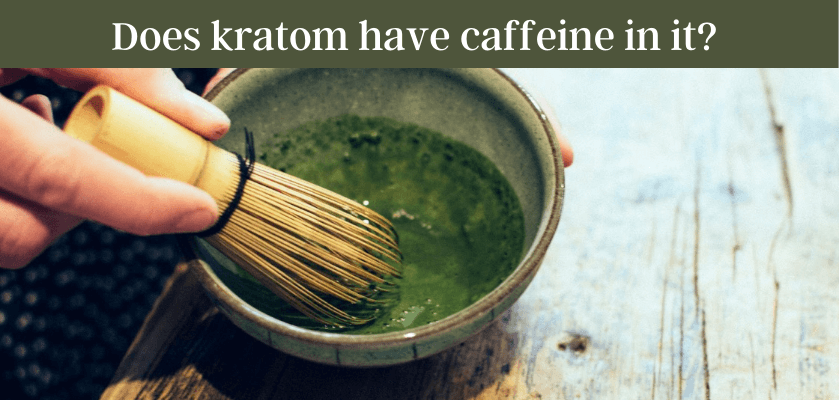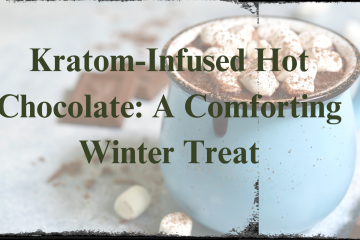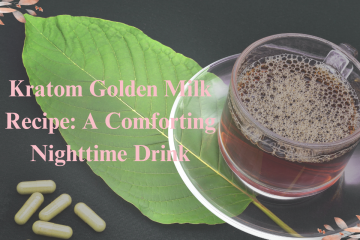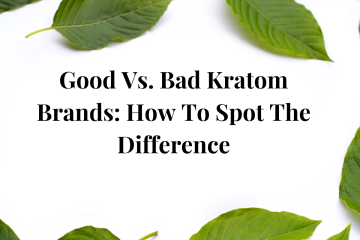As many botanists and kratom enthusiasts know, the kratom tree, or Mitragyna speciosa, is a member of Rubiaceae, which is the same family of flowering plants as the coffee plant. Both coffee and kratom are known for their alkaloids; caffeine in coffee—and mitragynine in kratom.
Does kratom have caffeine in it? Kratom has been found to have over 40 different alkaloids, none of which are caffeine. That being said, just how similar are kratom tea and coffee? In our article, we’ll discuss kratom and coffee, caffeine content, alkaloids, and everything you need to know about what’s in kratom.
What Is Caffeine?
To better understand what’s in kratom and coffee, it’s important to understand what caffeine is and how it works. Caffeine is an alkaloid, a class of naturally occurring nitrogenous chemical compounds that are found in a variety of plants and plant-derived products, including coffee and chocolate.
As you may already know, many hot beverages contain different levels of caffeine. Per cup, these are some of the average caffeine contents of different beverages:
- Brewed coffee: 80–200mg caffeine
- Yerba Maté: 70–90mg caffeine
- Matcha: 60–85mg caffeine
- Black tea: 40–120mg caffeine
- Oolong tea: 50mg–75mg caffeine
- Green tea: 12–75mg caffeine
- White tea: 6–75mg caffeine
- Decaf Tea: 5-10mg caffeine
- Herbal Tea: 0mg caffeine
Not all caffeinated products share the same concentration of other compounds. While caffeine is the commonly shared alkaloid, there are all kinds of other chemical structures that can give each beverage its own unique properties. Let’s take a closer look at what can be found in kratom and coffee.
Coffee vs. Kratom: Alkaloids
Both kratom and coffee contain alkaloids, but kratom does not contain caffeine. It does, however, contain its own unique set of alkaloids that can vary according to different factors. It’s an interesting topic—let’s get into the science behind coffee and kratom.
Alkaloids in Coffee
Although coffee is most famous for one particular alkaloid—caffeine—did you know that there are over 1,000 chemical compounds in coffee? Furthermore, variations in different processing methods used may affect the chemical profiles of different coffee products and different kratom strains.
Coffee contains a number of naturally-occurring chemical compounds, including several alkaloids. The alkaloids found in coffee are:
- Caffeine
- Putrescine
- Theophylline
- Trigonelline
Caffeine is the alkaloid that provides coffee with its famous stimulating effects. As coffee’s primary alkaloid, caffeine is responsible for the stimulating effects of coffee.
Although caffeine is a relatively well-researched alkaloid, coffee’s other alkaloids and numerous other chemical compounds aren’t as straightforward as they seem.
In fact, despite having been around for a long time, there is a lack of research on coffee’s numerous compounds. Coffee contains many compounds that can affect your health or interact with other drugs.
It’s essential to keep this in mind whenever mixing coffee with any other substances, especially since the FDA also does not require companies selling caffeinated products to label the amount of caffeine in their products. It is also voluntary for a caffeinated product company to decide whether or not they wish to put warning labels on their products for pregnant women, children, or individuals sensitive to caffeine.
Alkaloids in Kratom
While there is a lack of research on kratom, the herb has been found to have over 40 different alkaloids. The two primary alkaloids in kratom are mitragynine and 7-hydroxymitragynine. Kratom does not contain caffeine.
However, similar to coffee, researchers in a 2020 study on kratom’s chemical composition have revealed that it is likely that the processes used on kratom leaves can affect the alkaloid content in different commercially-available batches of kratom strains. In other words, differences between kratom strains come from production methods rather than genetic differences between kratom leaves:
“Our results also demonstrate that the identity and abundance of major alkaloids are highly variable in genetically similar kratom plant material, with some kratom products being dominated by the indole alkaloid mitragynine and others containing high levels of both mitragynine and the oxindole alkaloid speciofoline.”
Unfortunately, as kratom is not FDA-approved and is unregulated, not all kratom vendors provide lab tests to customers revealing the alkaloid content in their products. This is pointed out in the study:
“Such differences in activity would be difficult to predict for users, given that the variability in alkaloid content is in no way reflected in the product labeling. Additional studies are warranted to understand the underlying causes for variability in alkaloid content in kratom plant material, and to evaluate the therapeutic implications of this variability.”
Hopefully, the FDA will regulate kratom to keep fraudulent kratom off of the market and protect public health. Currently, the FDA advises Americans not to use kratom products at all.
Without regulation, kratom vendors could sell kratom without really knowing themselves what is in the different kratom strains they offer. Not only could you potentially buy kratom without knowing what alkaloids are in it, but without lab tests, there’s no guarantee that the kratom isn’t adulterated or contaminated.
This has important implications for customers looking to buy kratom.
Kratom and Caffeine Regulation
Since the FDA doesn’t require kratom vendors to follow good manufacturing process standards, lab tests, or transparent labeling—it’s on the customer to decide where they buy kratom from. Similarly, the FDA doesn’t currently require any foods or beverages that contain caffeine to include caffeine content on their labels—individuals who are sensitive to caffeine need to be aware of this and buy from a transparent vendor.
Although the FDA currently does not approve of kratom or regulate it, you can support kratom regulation on the state level by urging your state representatives to support the Kratom Consumer Protection Act (KCPA). The KCPA would require vendors to abide by certain manufacturing standards and other restrictions to protect customers from buying contaminated kratom.
If you’re sensitive to caffeine, it’s probably best to buy from companies that are transparent about the caffeine content in their products—the more information you can access about what you’re buying, the better.
Lab-Tested, Authentic Kratom for Sale Online
As we’ve seen, there’s a lot more to caffeine and kratom than it seems. Although kratom is notoriously under-studied, even something as widespread as coffee naturally contains far more chemical compounds than one might initially think.
Since interactions between kratom and caffeine have hardly been studied, it’s not recommended that you purchase enhanced kratom shots or other kratom products (such as liquid kratom shots) that have been mixed with caffeine.
If you’re looking to buy kratom that is pure Mitragyna speciosa, you’re in the right place. Here at Buy Kratom Bulk USA, we source our kratom directly from farmers in Indonesia and then lab test our batches to provide high-quality kratom strains. Check out our herbal kratom powders and kratom capsules for sale—and consider signing up for our newsletter for deals and discounts on bulk kratom.




